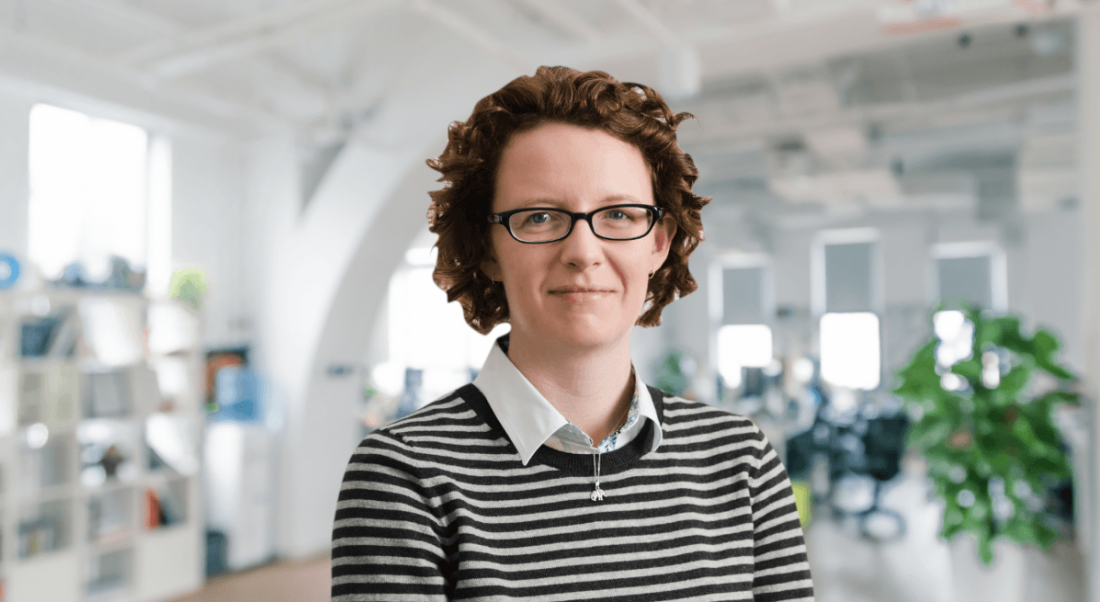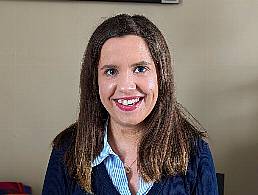EY’s Susan McNicholl has been working in the technology sector for more than a decade and excitedly awaits the next wave of technological progress, but a lack of diversity could throw a spanner in the works.
After starting out in applied chemistry, Susan McNicholl realised she craved something with a little more variety and human interaction, and so her love affair with the IT industry began. Now, she works as a solutions architect at EY.
With more than a decade of experience under her belt, McNicholl can speak crisply about the most exciting technologies that will soon become more widespread. She can also wax lyrical about the myriad benefits of working in STEM, but is quick to warn that the lack of diversity is a glaring potential issue that could derail attempts to roll out things such as AI and IoT. They could even, she explains, cause harm.
We chatted to McNicholl about diversity, speaking up, being curious and the projects at EY she’s the most excited about.
What drew you to this career area?
Initially, I studied applied chemistry in college but after a six-month work placement, I realised I would prefer a career that would provide me with more variety and human interaction. With this in mind, I switched courses to IT, which is also science-based with a lot of commonality in terms of being primarily a problem-solving, logic-based discipline, which is what I enjoy most. I haven’t looked back since.
What’s the best thing about working in this area?
I’ve worked in technology for over 12 years, with almost 10 in the energy sector. The energy sector is constantly faced with new challenges: increased focus on climate change, moving to a lower-carbon economy and regulatory change driving large-scale projects. Each of these is underpinned by technology, and working on big transformational projects is both challenging and rewarding.
I love the sense of achievement that comes with project-based work and seeing the tangible results of projects going live. This is usually a massive relief but also means I get to move on and start something new.
What’s the most exciting development you’ve witnessed in your sector since you started working in it?
In my opinion, the single biggest development in technology has been the move to smartphones and having access to so much information and services in the palm of your hand. This has driven demand for increased communications, more powerful and ever-smaller processing units, and the adoption of cloud-based technology.
The next major shift in technology will be the internet of things (IoT) and connected devices. The applications for this type of technology are endless – smart meters, other in-home devices, sensors in manufacturing, healthcare and energy systems.
It is now possible to deploy smart devices at scale at a reasonable cost, so we can expect to see this type of technology becoming more prevalent. I’m really excited to be working on a smart project for EY at the moment and hopefully I can build on this in the future.
Which of your personality traits makes you best suited to your job and this sector?
If you aren’t curious about how things work and constantly ask ‘why’, you can find yourself solving the wrong problem or perhaps only a symptom of the underlying problem. It takes courage to be curious, especially when you’re challenging people’s views and assumptions. However, getting to the root of an issue is essential if you really want to deliver solutions that have lasting value.
In the real world, problem-solving can be messy. There’s usually more than one way to solve a problem, and teams or individuals can all have different approaches. After careful assessment, the selected option still might not have the outcome expected. When we are invested in a particular solution, it’s important to be able to take a step back, assess the situation and change course. There are times when a way forward isn’t clear so it takes determination to navigate through the different challenges and obstacles that are thrown up along the way.
What’s been the hardest thing you’ve had to face in your career, and how did you overcome it?
The biggest hurdle I have faced is probably my own self-confidence. Early on in my career, I found it hard to speak up or ask questions, often waiting until after a meeting to approach someone one to one. Over time I realised that people didn’t necessarily know more than me, they just had more confidence to speak up and make their voices heard. I could probably be accused of asking too many questions now.
If you had the power to change anything within the STEM sector, what would that be?
The STEM sector suffers from a lack of diversity. Gender might be the most obvious, but there are other aspects of diversity that could also be improved. It’s proven that diverse teams generate better results and create more inclusive solutions.
There have also been some really tangible examples of where a lack of diversity within development teams has led to poor results. The story of the proximity sensor on the bathroom tap not recognising black skin because it was only tested by people with white or light skin is a really simple example.
More worryingly, it’s been reported that some software used in the criminal justice system in the US to predict reoffence rates erroneously identifies black people as having a higher reoffence rate. This is effectively an unconscious bias introduced by software developers.
Technology has the potential to have a profound impact on people’s lives. With the introduction of AI, we will become more reliant on machines to make decisions for us. Unless we have more a more diverse workforce, the negative effects will be amplified.
We need to tackle the root cause through increased investment in STEM in the education sector.
Is there something in your personal life that helps you/has helped you in your job?
When your job requires that you are constantly looking for solutions to problems, it can be hard to switch off completely. For me, being active and playing sports allows me to completely focus on something else. It also releases a bit of frustration, which is important at times.
How do you make connections with others in the STEM community?
Mainly through work and keeping in touch with people I’ve worked with previously. This is definitely something I need to work harder on.
Has mentorship or coaching been important in your career?
Different people have an impact or influence on your career at different times and in different ways. Sometimes this is in the form of a formal relationship like a line manager, coach or mentor, but I have found that informal relationships have provided me with some of the most useful career support and advice.
More recently, I’ve found that someone who’s removed from the day to day is able to provide an objective viewpoint and offer guidance or advice on how to approach a particular situation. Whatever form it takes, it’s essential for everyone to have or develop their own support structure.
What advice would you give to someone thinking about a career in your area?
Whatever field of IT you work in, it’s essential to invest time in understanding the business context and the organisation, industry or sector you work in. This will allow you to deliver better solutions and engage in more meaningful conversations with the end users, clients or customers.
Having the ability to communicate and understand both the IT and business environments is something that’s increasingly valuable, and has for me been something that continues to provide me with the challenges I need to stay motivated.




